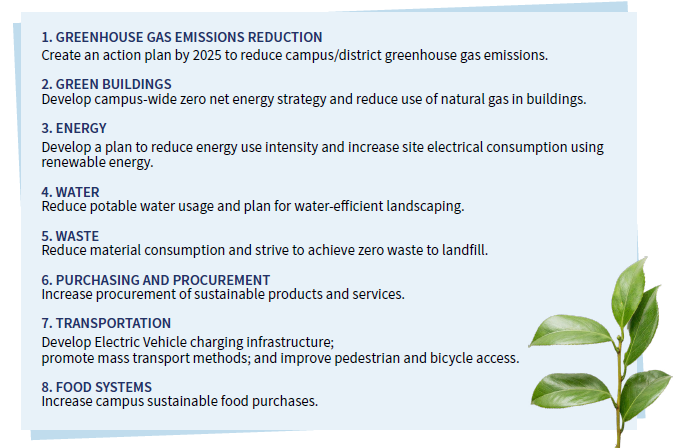Vision 2030 guides California Community Colleges' work on climate action. The system is advancing community college engagement with the three fields of climate practice: Workforce Development and Curriculum, Assistance to Communities for Climate Resilience and Sustainability in Facilities and Operations.
The Board of Governors has been a bold proponent of climate action, energy conservation, and other sustainability measures and has established policies since 2013. Since that time, the Chancellor’s Office has continued to make policy adjustments and in 2019 the Board adopted the Climate Change and Sustainability Policy. The 2019 policy laid a strong foundation for community college districts to align and guide their local-level work. Most recently, in 2021, the Chancellor’s Office revised the climate change and sustainability policy to reflect the needs of colleges and the perspectives of a diverse set of stakeholders. Guided by the Climate Action and Sustainability Steering Committee, the Chancellor’s Office created a new framework, the Climate Action and Sustainability Framework. The updated framework established systemwide goals and targets and integrated a comprehensive approach to leverage both colleges’ physical and social impact footprint.
-
California Community Colleges Leading the Way on Climate Action
Climate change is impacting the health, livelihood and safety of individuals across California. This inaugural report will highlight the unique roles in climate action of
the California Community Colleges, the largest system of higher education in the nation. -
Climate Action and Sustainability Policy
Climate change is one of the most pressing and critical issues of our time, requiring our collective attention to explore actions and solutions. -
Climate Action and Sustainability Goals (Proposed Changes)
Read proposed changes and updates to our system's climate action and sustainability goals.
Grant Opportunities
The Chancellor’s Office provides funding and training opportunities for colleges across the system through the Energy Resource and Sustainability Partnership (ERSP), which promotes energy efficiency and sustainability across the system. Learn more about grant opportunities through the ERSP Program and Funding website.



